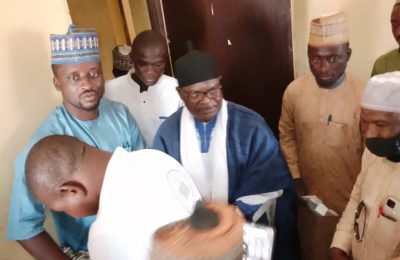
The Petroleum Industry Act (PIA) provides for a Host Community Development Trust, where every oil host community forms a trust that uses a percentage of the operating fund of the oil company operating in that community to develop the community. AMAECHI OKONKWO writes about how this aspect of the PIA is being implemented in some locality in Rivers State.
As Host Communities Development Trusts (HCDTs), petroleum joint venture operators and other stakeholders begin the implementation of the host community development component of the Petroleum Industry Act (PIA), there is hope that more than ever before, oil host communities will now witness more accelerated development.

It should be noted that a Host Community Development Trust is a creation of the Petroleum Industry Act where every oil host community forms a trust that uses the three percent operating fund of the oil company operating in that community to develop the community.
The trust fund in conjunction with the community, agrees on areas of need of the communities according to their priorities. The current implementation of projects is for the first phase of five years.
It is highly expected that this will improve the infrastructure and standard of living of these host communities which bear the brunt of the negative effects of oil exploration and production, yet lack necessary infrastructure and other amenities.
Indeed, many of such communities lack basic amenities like motorable roads, hospitals, schools and human capital development despite decades of hosting crude oil installations with the attendant demand on their land and environment.
However, with the commencement of the implementation of the three percent Operating Expenses (OPEX) of the Petroleum Industry Act (PIA) for the development of oil host communities, the situation of host communities is expected to change.
Already, stakeholders of the industry have commenced moves to ensure that host communities enjoy projects covering infrastructure, social, economic and human capital investments that will to lead to sustainable development of the communities and the people.
For instance, in Rivers State, one HCDT in conjunction with joint venture operators, Green Energy International Limited (GEIL) and Lekoil Oil Joint Venture, recently kicked off several projects in three of their host communities namely: Ugama Ekede, Ayama Ekede, Asukama & Asukoyet in Ikuru Town of Andoni Local Government Area of the state.
The projects are being provided in conjunction with the HCDT and the consultants, New Nigerian Foundation (NNF), which conducted a needs assessment alongside the community.
In the design, structure and processes of the companies’ social responsibility programme, the projects are intended to maximise value-accelerating factors throughout their host communities.
The projects to be executed in the first phase of the implementation of the five-year plan include: one kilometre access road into Ugama Ekede, scholarship for students in primary, secondary and tertiary schools, as well as a bursary for university students in Ugama Ekede, a town hall and a box culvert in Asuk-ama and a road project in Asukoyet.
Some other sustainable development initiatives have been undertaken through the MoU regime since 2014, until the establishment of the Host Community Development Trust under the PIA 2021.
Speaking on the commencement of the project, GEIL stated that it committed to contribute to society “by delivering its corporate social responsibilities through initiatives that have a positive impact on its host communities in Andoni LGA where it operates and the nation at large-by improving the quality of life of the people, promoting inclusive growth and environmental sustainability.”
GEIL added: “We improve the lives of local communities through accelerating value-driven development; economic-empowerment and human-asset building vision to help put our host communities on a path of transition to economic modernisation within an ’assisted’ self-development context.
“The design, structure, and processes of GEIL’s social responsibility programme are intended to maximise value-accelerating factors throughout our host communities of Ikuru Town, Ugama Ekede, Ayama Ekede, Asukama & Asukoyet.
“But our longer-term business, economic empowerment, and human-asset building vision to help put our host communities on a path of transition to economic modernisation, has further been accentuated through the transition from the MoU regime into the Host Community Development Trust (HCDT); providing a structural approach to community development outcomes backed by law.”
It listed the projects for the first phase period of five years in two categories of infrastructural projects and non-infrastructural projects.
The infrastructure projects include: construction of Asukoyet Link Road (Phase1); construction of Asukama box culvert; completion of Asukama Town Hall; and construction of Ugama Ekede Link Road (Phase 1).
The non–infrastructural projects are: Administration of scholarship/bursary and empowerment in Asukama; and administration of scholarship/bursary in Ugama Ekede through the development of its host communities.
The coming on stream of these projects have been welcomed by the benefiting communities. Royal fathers, community chiefs, women and youths of the three benefiting communities of Ugama Ekede, Asukama and Asukoyet expressed appreciation to the companies and the HCDT officials. They asked for the speedy completion of the projects which they believe will significantly improve their lives.
Paramount ruler of Asukoyet, King Brown, Asuk the VI, the Okama of Asukoyet, commended the joint venture operators and the HCDT for the road project awarded to his community stating that the road has been the major challenge of his people.
Brown said the lack of a proper access road has affected the social and economic life of his people, adding that cars and tippers avoid the community because of the poor state of the road.
He stated that: “By the grace of God all of us are happy to see that the joint venture (JV) is trying. The present road we are flagging off now is money from the community. It is what we got from the JV that is being used for this road.
“This project is our number one priority. Apart from our houses where we run to when it is raining, a road is another import thing any community needs.
“The road has affected us in so many ways. Sometimes one will have little money to build a house, but no tipper will agree to come and bring in sand for you because of no road. If this road is completed it will restore hope and bring progress in the community.”
Meanwhile, the chairman of Ugama Ekede Council of Chiefs, Harry Ekpirikpo, whose community got a one-kilometre road project, urged the contractors to ensure that the road is delivered according to the expected standard and in record time.
Ekpirikpo noted that at the end of the road project the community would want the board to complete the community town hall.
He said: “We need a road to drive cars into our community. We are happy. Before, you will have to trek a kilometre before you get to this community. The importance of this road you have come to flag off cannot be over emphasized; the road is vital to us.
“We have a town hall that we were to start before this board came. We are urging the board to complete that hall by next year. The foundation has been laid and taken to a level. Do it for us in the next phase of your project.
“We are seeking scholarships for our children. We cannot do all these infrastructures without factoring in the education of our children.”
The women were not left out. Women of Ugama Ekede who spoke through their leader, Mrs Cordilia Samuel Elijah, expressing pleasure with the flag off of the road project in their area.
She said it was the first time the riverine community would have a tarred road. She urged the contractor to ensure that the road is constructed based on specifications.
Mrs Elijah said: “We are very happy with the project. But, we are suggesting to them that the road should be the main road leading to the community. Although, the chiefs have the final say, but we want the right thing to be done, because it is for all of us.”
Speaking at the flag off at Ugama Ekede, the chairman Board of Trustees of the HCDT, Nathan Asuk, noted that the projects were nominated by the communities. He promised that the projects would be delivered to the people according to the specified terms.
Asuk, who was represented by Dr Metong Amakiri at the flag off, promised the communities that the project would be delivered based on specification and on time too.
He said: “We are here for brief interaction with the communities and to flag off the first phase of the road projects. We are all partners in the community development. We have no reason not to develop our communities.
“The project was nominated by this community and the contractor was chosen through a transparent process. Our duty is to ensure that the project is executed. We urge the contractors to ensure that the project is delivered based on specifications and on time.
“Our people are hungry for development, especially, like this road. We will not betray the community. Please, feel free, if any contractor tries to deviate or abandon the project, please our doors are opened to receive your reports.”
Partners to the JV, New Nigeria Foundation (NNF), that carried out the need assessment in the communities, also charged the communities to shun any form of disagreement and allow peace in order for the projects to be completed.
Mr Temitope Aremu, who represented NNF and led the needs assessment processes in the community, confirmed that, as stipulated in the PIA, the projects to be executed were chosen by the communities through a transparent process.
Speaking at Ugama community, Aremu said: “We want to thank the various arms of this community for this opportunity and to inform you that this project is community based; so I urge you to monitor it.
“Peace is the bedrock of development. I urge you to monitor the programme. If the project is concluded more projects will come. Development like this attracts good things. The JV is ready to deliver more projects.”
Aremu explained that: “It is a five-year development plan for the community and they are starting with the roads and other projects. PIA is a law and not an agreement. So, there are processes.
“Why we have not started since is because there are processes to put in place before implementation starts. All the set laws were followed so that nobody goes against the law.”
Read Also: Edo election, victory for democracy — IPCSL







